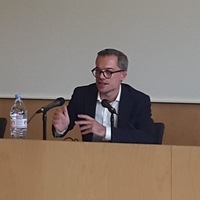
Marc Schachter
The primary focus of my research and teaching is late medieval and early modern French literature and culture. Secondary specializations include medieval and Renaissance Italian literature, the classical tradition, and gender and sexuality studies. Research in rare book and manuscript collections is central to my scholarship and has been facilitated by fellowships at Villa I Tatti, Harvard University’s Center for Italian Renaissance Studies in Florence, Italy (2009-10) and at the Folger Shakespeare Library in Washington, DC (2010-11). Some of my archival discoveries have led to their own dedicated studies. This is the case, for example, with my identification of a hitherto unknown sixteenth-century manuscript of Étienne de La Boétie’s "Discours de la servitude volontaire." Fundamentally, however, my archive fever is sparked by current critical questions; drawing together diverse approaches ranging from book history and reception studies to queer theory and intellectual history, my scholarship aspires to bridge the divide between philology and hermeneutics.
My first book, _Voluntary Servitude and the Erotics of Friendship: From Classical Antiquity to Early Modern France_ (Ashgate, 2008), was organized around a much-discussed topic, namely Montaigne’s textual relationship with his beloved friend Étienne de La Boétie. Drawing on Michel Foucault’s accounts of critique, governmentality and the care of the self, I expanded the ambit of earlier reflections on friendship and voluntary servitude in part by addressing La Boétie’s idiosyncratic translations of Plutarch’s _The Rules of Marriage_ and Xenophon’s _On Household Management_; rethinking the question of Montaigne’s politics in the _Essais_ as well as the anxiety of influence model often used to characterize his emergence as an author; and considering Marie de Gournay’s writings and editorial practices. In conversation with Jacques Derrida’s _Politics of Friendship_, I also offered an alternate genealogy of the friendship tradition highlighting women’s contested place in it as well as ambivalence about classical pederasty.
My second book project, “The Uses of Desire in Early Modern France and Italy,” explores how theories and representations of desire were (and indeed often still are) linked to questions of utility or productivity broadly construed, with particular attention to the reception of classical antiquity. Chapters address the politics of Louis le Roy’s _Sympose de Platon_ and other Renaissance translations of and commentaries on Plato’s _Symposium_; commentaries on and translations of Apuleius’ _The Golden Ass_; the epistemology of female same-sex desire in Brantôme’s _Dames galantes_ and Lucian’s _Dialogues of the Courtesans_; lesbian philology in commentaries on Martial and Juvenal; friendship, sex and tyranny in Marguerite de Navarre’s _Heptaméron_ and Benedetto Varchi’s _Storia Fiorentina_; and the politics of pederasty in Tasso’s _Gerusalemme liberata_ and the epic tradition.
Other ongoing projects on which I have already published focus on the ideological work performed by late medieval and early modern translations and editions of classical friendship texts in Italy and France and the illustrations in editions of Apuleius’ _The Golden Ass_. I am also co-editing a volume with John O'Brien--under contract with Champion--that focuses on the early circulation and reception of La Boétie’s _Servitude volontaire_ in the light of recent discoveries. A second collection, to be edited with Jennifer Ingleheart, will address translations of classical texts and the history of sexuality. On the distant horizon is a project about French and Italian engagements with the Ottoman Empire.
My first book, _Voluntary Servitude and the Erotics of Friendship: From Classical Antiquity to Early Modern France_ (Ashgate, 2008), was organized around a much-discussed topic, namely Montaigne’s textual relationship with his beloved friend Étienne de La Boétie. Drawing on Michel Foucault’s accounts of critique, governmentality and the care of the self, I expanded the ambit of earlier reflections on friendship and voluntary servitude in part by addressing La Boétie’s idiosyncratic translations of Plutarch’s _The Rules of Marriage_ and Xenophon’s _On Household Management_; rethinking the question of Montaigne’s politics in the _Essais_ as well as the anxiety of influence model often used to characterize his emergence as an author; and considering Marie de Gournay’s writings and editorial practices. In conversation with Jacques Derrida’s _Politics of Friendship_, I also offered an alternate genealogy of the friendship tradition highlighting women’s contested place in it as well as ambivalence about classical pederasty.
My second book project, “The Uses of Desire in Early Modern France and Italy,” explores how theories and representations of desire were (and indeed often still are) linked to questions of utility or productivity broadly construed, with particular attention to the reception of classical antiquity. Chapters address the politics of Louis le Roy’s _Sympose de Platon_ and other Renaissance translations of and commentaries on Plato’s _Symposium_; commentaries on and translations of Apuleius’ _The Golden Ass_; the epistemology of female same-sex desire in Brantôme’s _Dames galantes_ and Lucian’s _Dialogues of the Courtesans_; lesbian philology in commentaries on Martial and Juvenal; friendship, sex and tyranny in Marguerite de Navarre’s _Heptaméron_ and Benedetto Varchi’s _Storia Fiorentina_; and the politics of pederasty in Tasso’s _Gerusalemme liberata_ and the epic tradition.
Other ongoing projects on which I have already published focus on the ideological work performed by late medieval and early modern translations and editions of classical friendship texts in Italy and France and the illustrations in editions of Apuleius’ _The Golden Ass_. I am also co-editing a volume with John O'Brien--under contract with Champion--that focuses on the early circulation and reception of La Boétie’s _Servitude volontaire_ in the light of recent discoveries. A second collection, to be edited with Jennifer Ingleheart, will address translations of classical texts and the history of sexuality. On the distant horizon is a project about French and Italian engagements with the Ottoman Empire.
less
Related Authors
Innocenzo Mazzini
University Of Macerata, Italy
Alessandro Fusi
Università degli Studi della Tuscia
Giancarlo Abbamonte
Università degli Studi di Napoli "Federico II"
Marcello Nobili
Sapienza University of Roma
mario lentano
University of Siena / Università di Siena
Silvia Mattiacci
University of Siena / Università di Siena
Margherita Zanardo
University of Bologna- Rimini
Biagio Santorelli
Università degli Studi di Genova
InterestsView All (46)










Uploads
Books by Marc Schachter
Papers by Marc Schachter
Call for Papers by Marc Schachter
Commentary, speaking very generally, is a mode that arises when a culture prizes (for a variety of reasons) texts of an earlier cultural formation and must explicate them to contemporaries. In the case of the western tradition of commentary on “classical” (i.e., pre-Christian Greek and Latin) texts, works that had high status for certain sectors of the society confronted readers and scholars with sexual practices and attitudes that were foreign, in some cases repugnant to later expectations about sexual roles and acts. What makes the commentary – whether marginal, interlinear, or lemmatic – a special instance within reception is that by its very logic it must confront the ipsissima verba of the original author (or at times establish what those verba might have been). In this regard, it is most similar to translation. Of course, commentary can duck the challenge, just as a translation can omit offensive passages, but this is itself worth noting. The expectation, however, that the commentator will do his/her duty to explicate a text creates a library of productive negotiations that merit study. Some may adopt a censorious tone, offering “moral” in addition to philological instruction. How do the two interact? How does prejudice impact scholarship and when does philological rigor trump prejudice? In other instances, specifics in the classical text may offer a scholar of a later period an opportunity to speak about nefanda, license in other words to examine and discuss topics that would otherwise be taboo. In such cases, one might see the space of the margin (whether literal or figurative) as liberatory. Moreover, commentaries themselves have their own reception histories whose contribution to the histories of sexuality and gender have hardly been addressed.
The conference, it need hardly be said, will not be exhaustive, but it will present a broad set of examples in the commentary traditions of many different Greco-Roman authors, with commentaries in Greek, Latin and vernaculars, from late antiquity to the present day. We will also have papers addressing similar (or very different) negotiations in commentary on legal texts, and within the commentary traditions in Hebrew, Japanese, and Chinese. We hope that the conference as a whole will contribute to a broader appreciation of the ways the histories of reception, sexuality and gender are mutually imbricated in numerous contexts.
Drafts by Marc Schachter
Commentary, speaking very generally, is a mode that arises when a culture prizes (for a variety of reasons) texts of an earlier cultural formation and must explicate them to contemporaries. In the case of the western tradition of commentary on “classical” (i.e., pre-Christian Greek and Latin) texts, works that had high status for certain sectors of the society confronted readers and scholars with sexual practices and attitudes that were foreign, in some cases repugnant to later expectations about sexual roles and acts. What makes the commentary – whether marginal, interlinear, or lemmatic – a special instance within reception is that by its very logic it must confront the ipsissima verba of the original author (or at times establish what those verba might have been). In this regard, it is most similar to translation. Of course, commentary can duck the challenge, just as a translation can omit offensive passages, but this is itself worth noting. The expectation, however, that the commentator will do his/her duty to explicate a text creates a library of productive negotiations that merit study. Some may adopt a censorious tone, offering “moral” in addition to philological instruction. How do the two interact? How does prejudice impact scholarship and when does philological rigor trump prejudice? In other instances, specifics in the classical text may offer a scholar of a later period an opportunity to speak about nefanda, license in other words to examine and discuss topics that would otherwise be taboo. In such cases, one might see the space of the margin (whether literal or figurative) as liberatory. Moreover, commentaries themselves have their own reception histories whose contribution to the histories of sexuality and gender have hardly been addressed.
The conference, it need hardly be said, will not be exhaustive, but it will present a broad set of examples in the commentary traditions of many different Greco-Roman authors, with commentaries in Greek, Latin and vernaculars, from late antiquity to the present day. We will also have papers addressing similar (or very different) negotiations in commentary on legal texts, and within the commentary traditions in Hebrew, Japanese, and Chinese. We hope that the conference as a whole will contribute to a broader appreciation of the ways the histories of reception, sexuality and gender are mutually imbricated in numerous contexts.